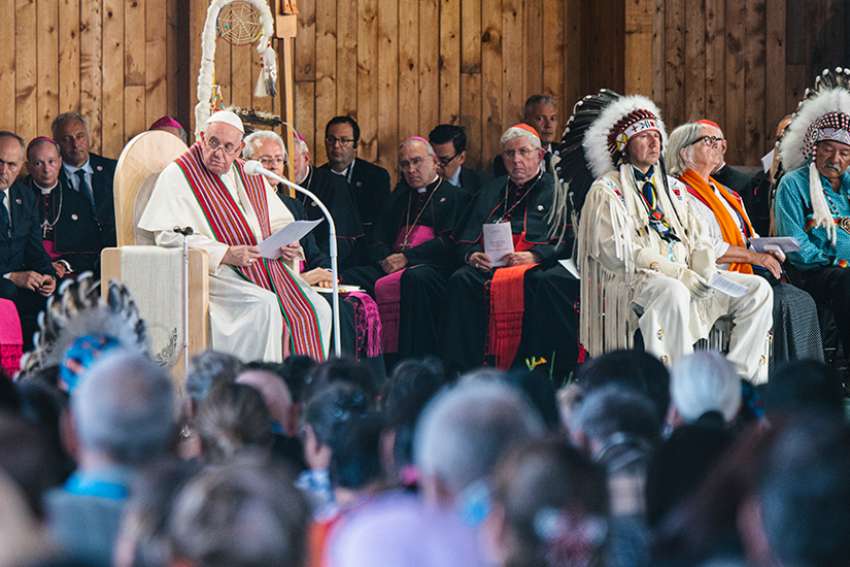Catholics tend to wait on their bishops before they act. But that waiting is a sign that clericalism is not just a disease of clerics but also of the laity. The laity are those called to transform society in the light of the Gospel.
Racism in Canada has not disappeared in the wake of the papal visit. Individual racism and systemic racism persist. The stereotype of the racist is the knuckle-dragging Neanderthal who voices loud, offensive remarks and can even be violent toward non-whites. That stereotype lets most of us off the hook.
It ignores those who claim residential school survivors will only tell their stories until financial compensation dries up or who say that whites are the most discriminated group.
Individual racists can also be nice people who claim that they “get it” and believe they are more enlightened than those who don’t. In fact, the battle against prejudice in our hearts is never-ending, one which will not end until we take our last breath.
Systemic racism is typified by the Indian Act, the nearly 150-year-old statute that proves beyond doubt in Canada not everyone is equal before the law. Systemic racism has led to the higher infant mortality rates, lower life expectancy and lower education rates among Indigenous people. It is seen in the wildly out-of-proportion number of Indigenous inmates in our prisons and the greater threat of racial profiling and police brutality against the Indigenous.
What should we do now that the Pope has gone? First, we need to decide that things can change, ought to change and will change. We start with ourselves. We need to develop greater self-awareness, engage in ongoing education, build relationships and advocate for victims.
We need to discover our own racism. Can we accept sincere feedback from an Indigenous person about our negative racial attitudes without getting defensive, growing angry or breaking down in tears. The testimony of non-whites is that overwhelmingly we cannot.
If we are to change, we must see ourselves as those at the bottom of society’s hierarchy see us. Spiritual renewal only comes when we recognize and take responsibility for our own complicity with evil.
Each of us, whether alone or in groups, need to engage in ongoing education about the history and effects of racism in Canadian society. We need to read about or view videos on colonialism and the theft of land from the First Nations. We can learn about the history of racism in other countries and about relatively successful attempts to overcome it.
We will also benefit from building relationships with Indigenous people. We might join our parish conference of the Society of St. Vincent de Paul, volunteer with an Indigenous organization or organize people in our parish to visit a nearby reserve. We only need use our imagination to find ways to draw back the curtain which often separates settlers from Indigenous.
Bob Joseph’s book, 21 Things You May Not Know About The Indian Act, contains a personal pledge of reconciliation which can form one’s commitment to end racism.
Finally, as our knowledge and friendships grow, we will advocate for and with Indigenous people to end racially based injustices such as the Indian Act. We need to call on MPs and federal cabinet ministers to create a country in which reconciliation is a living reality.
The Jewish philosopher Susan Neiman’s book, Learning From the Germans, contrasts Germany’s ability to find and conquer the anti-Semitism that led to the Holocaust with the failure of the United States to defeat the racism embedded in slavery and the age of racial terror prior to the civil rights movement.
Neiman’s book is ultimately one of hope that evil can be defeated when a people do the courageous, painstaking work of confronting their own evil.
Reconciliation is an obligation. More than that, it is a path to greater fullness of life. To the extent we seek it, we will find it. And our country will move towards the only wealth that counts.
Pope Francis’ visit will not have been in vain.
(Glen Argan writes his online column Epiphany at https://glenargan.substack.com.)


